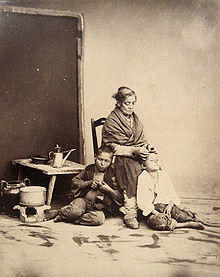
Photograph by Giorgio Sommer (1834–1914); Famille napolitaine — a Neapolitan mother searching for lice in her son's hair.
Nitpicking is a term, first used in 1956, that describes the action of giving too much attention to unimportant detail.[1][2] A person who nitpicks is termed a nitpicker.[1][3]
The terminology originates from the common act of manually removing nits (the eggs of lice, generally head lice) from another person's hair.[4]
As nitpicking inherently requires fastidious attention to detail, the term has become appropriated to describe the practice of meticulously searching for minor, even trivial errors in detail .[5]
Nitpicking has been used to describe dishonest insurers,[6] and bullying employers.[7]
References
- ^ a b "Definition of NITPICK". www.merriam-webster.com. Retrieved 11 January 2021.
- ^ "NITPICKING | meaning in the Cambridge English Dictionary". dictionary.cambridge.org. Retrieved 10 January 2021.
- ^ Dash, Rajendra Kumar (2015). Professional learners dictionary of spoken English. PHI Learning Pvt. Ltd. p. 336. ISBN 978-81-203-5225-4.
- ^ Meinking, Terri; Taplin, David; Vicaria, Maureen (2011). "27. Infestations". In Schachner, Lawrence A.; Hansen, Ronald C. (eds.). Pediatric Dermatology E-Book. Elsevier. p. 1554. ISBN 978-0-7234-3540-2.
- ^ Grove, David (2013). Tapeworms, Lice, and Prions: A compendium of unpleasant infections. Oxford University Press. p. 114. ISBN 978-0-19-165345-2.
- ^ Jean-Marc Bourgeon, Pierre Picard. Fraudulent Claims and Nitpicky Insurers. cahier de recherche 2012-06. 2012
- ^ Management Bullies: The Effect on Employees. Journal of Business Studies Quarterly. 2013, Volume 4, Number 4. ISSN 2152-1034